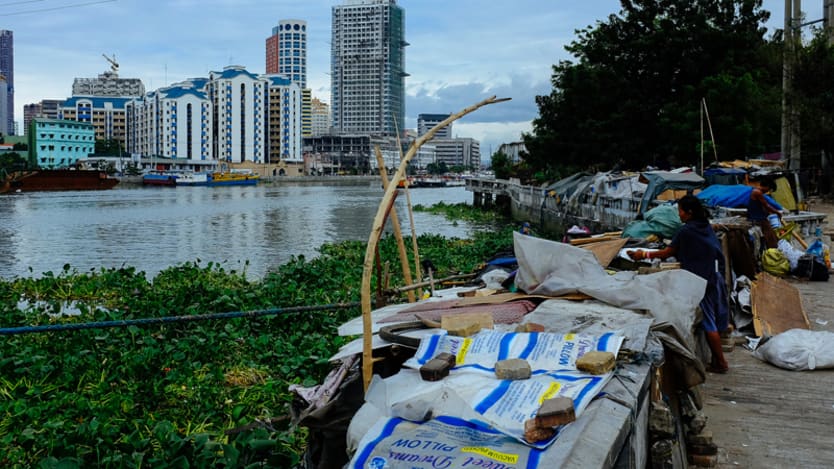
MANILA — For decades, NGOs and civil society actors have been working to address and reduce poverty in the Philippines. But in recent years, some have begun to question their impact.
“By working together, we may find solutions that we won’t be able to figure out on our own.”
— Reynaldo Laguda, executive director, Philippine Business for Social ProgressDespite organizations offering scholarships, conducting medical conventions, and providing housing, there remains a significant number of people living in poverty in the country, said Brother Armin Luistro, president of Philippine Business for Social Progress, a corporate-led social development foundation, during a roundtable in Manila last week.
Although poverty rates fell from 26.6 percent to 21.6 percent between 2006-2015, according to World Bank data, there are still 22 million Filipinos living below the poverty line.
“Why are they perpetually poor?” Luistro asked.
Part of the reason is that most NGO programs have worked in silos for so long, he said. In addition, interventions tend to be short-term and are not designed to help individuals and families become self-sufficient.
Zero Extreme Poverty PH 2030, or ZEP PH 2030, wants to change that. Following a national poverty summit in 2015, 17 civil society organizations formed a collective movement with the aim of reducing poverty, in particular extreme poverty, among more than 1 million Filipino families by 2030, the year the Sustainable Development Goals are due. To do that, they figured, they would need to change their mindset and approach.
Part of it starts with dialogue.
“We thought, ‘why don’t we listen to what the poor have been saying?’” said Reynaldo Laguda, executive director of PBSP. This helps organizations understand priorities from the community’s perspective, instead of prioritizing interventions based on their own organizations’ focus and expertise. It also helps them identify what other interventions are required on the ground, and to seek out NGOs, government units, or businesses that could fill the gaps.
This comes with challenges. Community consultations often take time, and sometimes what is needed may not be readily available, Laguda said. There may not be an organization available that can work on sanitation, for example, or funding to build potable water sources in the area. Another challenge is making partnerships between organizations work, given their different ways of working.
But collaboration is key, Laguda emphasized.
“By working together, we may find solutions that we won’t be able to figure out on our own,” he said.
The alliance is yet to receive funding for its work, and organizations are currently continuing with their programs as agreed with their donors.
But Laguda argued there can be trickle-down effects to the agenda they’re trying to achieve.
“In the course of interventions, almost always you achieve other outcomes in relation to the grant you have,” said the PBSP executive.
At the moment, they are taking a shared approach to identify the 1 million families they hope to help graduate out of poverty over the next 12 years, starting with locations where they are already working.
Identifying the poorest of the poor can be a daunting task, given the sometimes varied data on extreme poverty in the Philippines. The World Bank put it at 6.7 million people in 2015, based on an international poverty line of individuals living on less than $1.90 a day. That same year, the Philippines’ Statistics Authority estimated the number of people in extreme or subsistence poverty at 8.2 million, based on the national poverty threshold of 21,753 Philippine pesos a year, or roughly $1.14 a day.
But the alliance has agreed on their own definition of what it means based on five indicators:
A family living on an average daily income of 350 Philippine pesos a day (less than $7).
A family whose children between 5-18 years old are unable to attend school.
A family where each member has missed at least two meals in a week.
A family with no access to safe, potable water.
A family with no access to their own sanitary facilities.
The definition was born from a series of consultations between the alliance and communities, Laguda said. He cautioned that this is a working definition, but it is helpful as they identify families they should target with their interventions.
Taking the needs of the whole family into account, rather than economic income alone, ZEP PH 2030 has identified eight priority themes for intervention: agriculture and fisheries; education; environment; health; housing and shelter; livelihoods; peace and human security; and social justice.
The coalition — still limited in numbers and funding — face questions of how they plan to accomplish such a huge undertaking. Most are local organizations, with a few exceptions including the German development agency GIZ, which implements technical cooperation projects, and the U.N. Development Programme.
ZEP PH 2030 says it still refining its model, but is hopeful that others, including more international players, will join the call for collaboration and convergence in addressing poverty in the Philippines.








